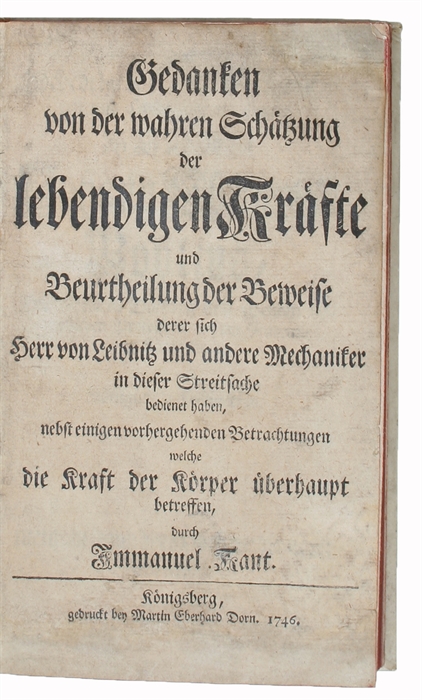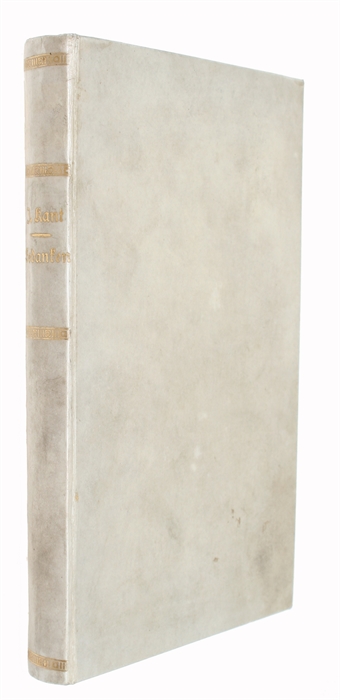FIRST EDITON OF KANT'S FIRST PUBLICATION
KANT, IMMANUEL.
Gedanken von der wahren Schätzung der lebendigen Kräfte und Beurtheilung der Beweise derer sich Herr von Leibnitz und andere Machaniker in dieser Streitsache bedienet haben, nebst einigen vorhergehenden Betrachtungen welche die Kraft der Körper überhaupt betreffen. [i.e. Thoughts on the True Estimation of Vital Forces].
Königsberg, Martin Eberhard Dorn, 1746.
8vo. Nice newer full vellum with gilt spine. Title-page a bit soiled and with neat reapair to blank margins, far from affecting text. A bit of occasional browning and soiling. one plate repared from verso, no loss. Title-page + 16 pp. + pp. (3) - 240 + 2 folded engraved plates. Fully complete.
The exceedingly scarce first edition of Kant's debut, the first work that he ever published, at the mere age of 22. The work constitutes a milestone in the modern discussion of dimensionality.
Immanuel Kant (1724-1804) - now considered, along with Plato and Aristotle, the most important philosopher of all time -, entered the university of Königsberg at the age of 16, in 1740. Here he studied mainly mathematics and physics under Martin Knutzen and Johann Teske, until his father's death in 1746. These years proved formative for the young philosophical genious, and his profound interest in the philosophy of science stems from this period. When his father died, however, Kant was forced to break off his studies to help provide for the family, which he did by working as a private tutor for three different families over a period of about nine years. Finally in 1755 he was able to resume his studies at the university, and the same year he received his doctorate of philosophy; in 1770 he was finally given a permanent position, as professor of logic and metaphysics at the University of Königsberg. It is here that he writes the works that have changed the entire trajectory of modern thought - his three seminal critiques, that of pure reason, that of practical reason, and that of judgment.
The foundation of Kant's philosophy is laid during his early years of studying, which culminate is this his first publication, "Thoughts on the True Estimation of Living Forces", which constitutes an attempt to determine space dimensionality from a physical law. Kant initially adapted Leibnitz's view and tried to explain the nature of space by means of the forces of monads that cause such substances to interact. Although its basic idea was abandoned during his critic period, Kant's first work nonetheless constitutes a
milestone in the modern discussion of dimensionality.
"The two main influences on Kant in his philosophical reflections on science were Leibniz and Newton. During his first period of study at the University of Königsberg, from 1740 to 1746, Knutzen taught that version of Leibniz's metaphysics which the German philosopher Christian von Wolff had made popular. He also taught the mathematical physics which Newton had developed. He revealed to the young Kant the various oppositions, puzzles, and contradictions of these two great natural philosophers.
The nature of space and time was what interested the young Kant most in these disputes between Leibniz and Newton. He studied the famous exchange of letters between Leibniz and Samuel Clarke, a defender of Newton's philosophy. [...] In his early years Kant pondered the nature of space and time first from the point of view of Leibniz and then of Newton, but eventually he found both positions unsatisfactory." (Ellington, in DSB: VII, pp. 225-26).
The nature of space and space dimensionality that Kant attempts to uncover and explain in this his first work comes to found a basis for all his later thought. The role that physics, especially the concepts of space and time, plays for his view of the world and for the development of his philosophical thought is immense, and his earliest thoughts on the subject understream all of his later thought.
Warda nr. 1.
Order-nr.: 46723


